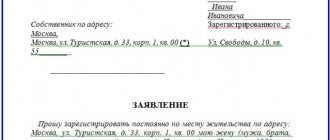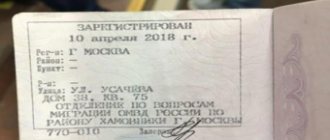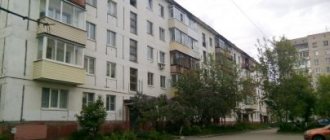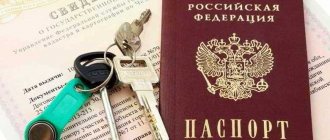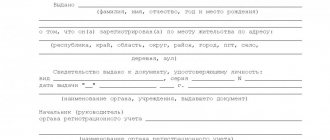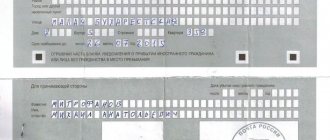Very often, owners face the problem of registering friends or relatives in their own apartment, and this adds unnecessary headaches to this matter. This becomes especially difficult when registering persons under the age of majority.
Dear readers! Our articles talk about typical ways to resolve legal issues, but each case is unique. If you want to find out how to solve your particular problem, please use the online consultant form on the right or call. It's fast and free!
In this case, an excellent option would be registration without the right to living space, which has many advantages and with its help you can avoid a number of difficulties.
Differences between registration and registration without the right to living space
The legal aspect of Soviet “registration” was to control the residence of citizens at a particular address. With the beginning of the reform in Russia in the 90s of the last century, the traditional concept of “registration” was replaced by registration at the place of residence, which has a notification nature for the state.
The registration regime has been introduced for citizens of the Russian Federation at any age, including for guests of the country, if they do not have a residence permit. In fact, by registering, citizens notify the migration service of their current place of residence.
Registration does not mean that they own real estate and can dispose of it, although “registration” at one time confirmed precisely the ownership rights. Today, Law of the Russian Federation No. 5242-1 of June 25, 1993 stipulates that all citizens of the Russian Federation must have a place where they are “registered” (read “registered”) permanently. At the same time, the legislator gives them the opportunity to choose their place of residence and move within the territory of Russia for temporary stay or permanent residence.
According to constitutional law, a citizen can live in any region of the Russian Federation for as long as necessary. In addition, thanks to the registration regime, the state regulates migration policy.
The concept and purpose of registration
The concept of “registration” has not legally existed in the Russian Federation since 1993. Since then, the term "registration" began to be used. Then the totalitarian regime was replaced by democracy, which took as its basis the thesis that the institution of registration infringes on human rights in the new Russia.
Registration can be permanent or temporary. The first option is no different from registration - a stamp is affixed to the passport indicating the citizen’s place of residence.
Temporary registration indicates where a person is currently located. In this case, he receives a certificate, but there is no mark in the passport.
In relation to what permanent registration affects, the following fundamental point appears - its presence provides the right to dispose of real estate in some way.
What is registration (“propiska”) without the right to living space?
After registration, the citizen receives the status of a resident at the address indicated in the application. The residential premises may be his property or be hired or rented. Thanks to this status, it becomes possible to use the property located in the residential premises on an equal basis with other residents and registered residents. A permanently registered person at a specific address receives rights to common property if it is an apartment building.
In addition, with the consent of the owner, the registered person can “register” his family members at the same address if he is not the owner. His minor children are registered automatically. In this way, permanent registration is issued without the right to living space, i.e. those registered are not the owners of the premises.
The owner of a residential premises can register there permanently; his rights to the living space are determined by property documents. If a citizen owns several properties, this does not mean that it is necessary to register in each home.
Agreement with the tenant
In order to prevent unpleasant situations, it is recommended to enter into a rental or free rental agreement with a new tenant, even if he is a relative, which will spell out all the rights and obligations of both parties.
The agreement usually contains the following information:
- the period for which a person is temporarily provided with a house and registration in it;
- rights and obligations regarding housing maintenance;
- degree of relationship, if any.
The last point must be indicated if you have to evict a person through the court. If he is recognized as a direct relative of the owner of the house, then this will be more difficult. This agreement must be drawn up in the presence of a notary officer, who will confirm the legality of the paper with his signature.
Living conditions for “registration” without the right to living space
The living conditions for temporary registration are the same: the tenant uses the property, pays utilities and rent if necessary. To be on the safe side, the owner can draw up an agreement in addition to the main free rental agreement that gives the right to terminate the relationship unilaterally. If rent is expected, then all the necessary clauses in relation to it are included in the contract as a separate clause.
According to the social tenancy agreement, registration is issued temporarily or permanently, but more often for permanent residence. In this case, the main employer enters into an agreement with the local government, members of his family have the right to register with him, and no rent is provided.
How to prevent a tenant from becoming a co-owner
There is no such concept as registration in an apartment without the right to property in Russian legislation. In this case, we are talking about persons who have obtained temporary or permanent registration.
Registration does not give any ownership rights to residential premises. You can become the owner of a home only if the legal owner sells or otherwise transfers his share in the apartment or on the basis of a corresponding court decision.
The question of how to register a person without the right to property is relevant when registering a municipal apartment. You should know that all residents who have permanent registration in such housing can participate in the privatization process.
It is almost impossible to discharge a person from a municipal apartment without his consent. It will also be impossible to privatize living space without his participation.
Types of “registrations” without the right to living space
In practice, registration without the right to living space is most often issued by relatives permanently or for a long period of time, when the citizen and his family do not have their own living space.
In another case, temporary registration is required at the place of study or work.
If a citizen has already registered permanently, then when registering for temporary registration, there is no need to register from a permanent address. If the move is carried out within the same locality or region, then there is no need to re-register for registration.
The legislator indicates that registration at the address where the citizen plans to reside permanently must be considered permanent. Temporary registration must include registration associated with a forced move to live at an address other than the permanent one for some time. Permanent registration is unlimited.
The temporary registration period expires by itself, as indicated by the person registering when registering in the application. The same period must be indicated in the temporary registration permit from the owner. When deregistering from your permanent place of residence, you must be deregistered.
When registering permanently, a stamp is affixed to the citizen’s passport. When a temporary “registration” is issued, a certificate is issued indicating the period of stay of the citizen at a certain address.
Citizen registration system
During the existence of the USSR, the institution of registration operated to control internal migration of the population. The procedure for assigning people to an administrative-territorial unit was called the same term “registration”.
Currently, the system of registering citizens is called registration. The legislation of the Russian Federation requires everyone to register at their place of residence or stay.
To register, citizens submit:
- passport or other identity document;
- birth certificate in case of registration of a minor child;
- a document confirming the right to use residential premises.
Registration can be temporary or permanent. The second type is provided for citizens who travel somewhere for a certain period of time. Registration is carried out at the place of stay, for which a certificate is issued.
Permanent registration is unlimited. It is issued at the citizen’s place of permanent residence and is confirmed by a stamp in the passport.
Find out about the differences in terminology from the article “What is the difference: registration and registration“.
Features of temporary “registration” without the right to living space
A registered citizen cannot in any way prevent a legal transaction that the owner wishes to conduct with real estate. During his registration, the residential premises may well be sold, no one will ask his consent. The registration period will expire from the moment the transaction is completed. Such a citizen also cannot participate in privatization if he is “registered” in municipal housing. Only permanently registered persons are entitled to it.
If meters are not installed in the residential premises, then the amount of utility payments will not be affected in any way by the temporary registration of another person. Payment will be charged only to those registered permanently.
Rights provided by registration
The main thing that the owner of the living space needs to remember is that registration does not give the right to own the apartment. That is, the person registered in the house will not be able to dispose of it, carry out sales, rental, or donation transactions.
Registration gives the following rights:
- service in a public medical institution in the region;
- educating a child in a district school or kindergarten;
- official employment;
- registration of pensions, subsidies, benefits;
- the possibility of obtaining a mortgage or loan.
Along with rights, the following responsibilities are imposed on a person:
- pay utility bills;
- maintain and maintain the decent condition of the apartment.
Particular care should be taken in the case of council housing. During privatization, all people registered in a given living space have the right to participate in the process, which means they become shared co-owners and receive joint ownership rights to the house. Thus, a person becomes the owner of real estate without having to buy it, simply by registering at the right time.
Risks of the owner when registering without the right to living space
The owner, having “registered” a citizen and his family permanently, is at risk, since it will be impossible to issue an “extract” without their will. Such issues often end in court proceedings; permanently registered citizens can present evidence that they have no other address for registration, i.e. they have nowhere to go.
If a minor child or another family member registers in a municipal apartment, he will receive the right to participate in privatization. This means that the share of everyone registered earlier will automatically decrease.
When an apartment owner registers another citizen, it is important for him to pay attention to several points:
In what relationship does this citizen stand in relation to the owner?
How reliably can one know that a citizen does not have his own minor children (as well as adopted children).
Whether the woman to be prescribed is pregnant.
In the most common cases, when it comes to registering someone else’s adult, the risks are minimal: in this case, registration does not imply any rights to provide living space, i.e. We are talking only about registration without legal consequences. It doesn't matter:
presence of disability;
presence of state awards;
belonging to any of the preferential categories of citizens;
having refugee status.
Thus, the state guarantees that the owner’s apartment is inviolable, even if several strangers are “registered” in it. The only case when a person has the right to claim living space relates to close relatives who, by law, have similar opportunities.
The only significant risk for the apartment owner is associated with two factors:
If the person prescribed does not agree with the need to write it out, such a problem will have to be resolved only through the court. A registered citizen (including on the basis of temporary registration) has the right, without the consent of the owner, to also register all his minor children, who, however, still do not have any property rights. However, it will be much more difficult to write them out, including in court.
Increase in utility bills. This risk is the main one, since an actual increase in payments for all utility services will inevitably occur. If meters are installed, payment will be charged only according to their readings. However, some services (for example, housing maintenance) are charged according to the number of registered ones - for example, the volume of garbage removed directly depends on the number of residents. If there are no meters, the situation is aggravated because utilities will charge according to established standards, which are determined by the number of registered residents. The actual residence or absence of a registered person is not grounds for reducing or increasing utility bills. Thus, the option is especially unprofitable if a citizen is registered and lives in a house without meters - then the payment increases, even if in fact he does not use water, electricity and other services.
Documents that will be provided after registration
If we are talking about permanent registration, then the registered citizen will have a corresponding stamp in his passport.
It will confirm that the person is registered in a certain residential area. The passport will need to be handed in along with the documents ; instead, they will provide a receipt indicating that the passport was confiscated for a valid reason.
A similar rule is enshrined in paragraph 18 of the Administrative Regulations, which forces citizens to confirm their registration with a stamp in their passport.
Risks of the owner when “registration” without the right to the tenant’s living space
Despite the fact that registration without granting the right to living space does not have legal risks as such, the tenant’s lifestyle itself carries several possible threats.
The tenant takes out a loan and makes arrears: collection services and/or bank representatives will also visit the place of residence (based on temporary registration), as a result of which the owner will have to explain that such a person does not live here (if in fact the citizen has already left)
The tenant commits a crime: the police will definitely go to the owner; in worst cases, he may even be considered a suspect (accomplice)
The tenant evades conscription into the Armed Forces: summonses will be sent to the registration address, and in the worst cases, the police begin to suspect that the owner is helping the evader by hiding his location
The tenant violates traffic rules: fines will be sent to the temporary registration address, so the owner will have to notify the tenant about this
The tenant violates public order; there is a direct threat to the personal safety of the owner, his family, as well as the risk of being taken to the police based on complaints from neighbors.
Thus, the only real danger is the tenant’s unseemly behavior, and not the loss of living space, which is completely excluded by law. Therefore, it is better to get to know the tenant well and not to register dubious persons in the apartment, even if they promise not to actually live there.
What risks may exist?
The owner, when providing his home for registration, must know in advance what risks he can expect and how to prevent the development of a conflict situation. An important point is the type of registration - permanent or temporary registration, as well as the type of housing.
If the housing is privatized or purchased as part of a purchase and sale transaction, then there is no need to worry particularly about this, since the owner is the privatization participant or the buyer.
But when a citizen receives registration in a municipal apartment, and then the housing is privatized in the future, this person will be able to become a co-owner of the property. As for the registration of a minor, it is very difficult to register a child in the future, and in some situations it is impossible.
How to obtain permanent “registration” without the right to living space
You can register at any branch of the Federal Migration Service (FMS) or through:
MFC;
Passport Office;
management company (housing office);
State Services portal.
Registration can be issued to a relative or a stranger. If, for example, the owner is a husband, and he registers his wife, then she receives ownership, even if it has not been documented (Family Code, Article 34 “Joint property of spouses”).
The rest of the citizens, even the children of the owner, are registered without the right to living space. If the premises belong to several owners, then they must give their consent to the registration of any citizen, except for minor children (Civil Code, Article 247 “Ownership and use of property in shared ownership”). The consent of the co-owners is drawn up in writing and certified by a notary.
A new tenant is registered in a municipal apartment with the consent of the remaining registered ones. To register in a dormitory, the employer must give his consent if he officially works for him.
Registration procedure
There is a certain algorithm of actions according to which the owner and the citizen registering must collect documentation and appear at the place where registration will be carried out. This process does not take much time, but you need to know its features.
Where to contact?
Today, registration is carried out at the offices of the MFC, the Federal Migration Service or the passport office. Many people have noticed that if you use the Gosuslugi portal, you can significantly reduce the waiting time. The management company is also obliged to accept a corresponding application from citizens.
If the homeowner has decided to provide registration to his relative or friend, then he needs to follow the following algorithm of actions:
- The first thing you need to do is visit the MFC, the Federal Migration Service office or the passport office, where you will need a number of documents.
- A citizen who is going to register at a new address must be removed from the previous place of registration.
- If, in addition to the person applying, there are other owners of the premises, they will require written consent for registration; if there is a single owner, one consent from him is required.
- A citizen who wishes to obtain a residence permit fills out an application for its provision at the address of the apartment owner. If he has not previously managed to de-register at his previous place of residence, he must indicate the arrival and departure addresses in the application.
- Documents are being submitted.
- The person registering appears to receive a passport, where a registration stamp will be affixed.
In order to save time and not stand in line, you can make an appointment to receive documents in advance: to do this, you should leave a registration application on the website of the State Services or MCF.
Required Documentation
To submit applications, a number of necessary documents will be required from both parties. These include:
passports from the owner and the person wishing to register;- property registration certificate;
- if other owners cannot visit the registration office, they send proxies (if necessary);
- an agreement that serves as the basis for the transfer of ownership of housing.
The person registering will be required to:
- military ID, as well as registration sheet (if he is liable for military service);
- an extract provided from the previous place of registration.
Registration deadlines
The registrar informs about the period required for reviewing the papers. Sometimes this period is three days, but the registrar can increase it to eight. In situations where an extract from the previous place of residence has not been made, the process is delayed for up to 30 days.
Mandatory deadlines for “registration” without the right to living space
By law, registration is required within 7 days from the moment a citizen arrives at his new place of residence. If he is discharged from his permanent place of residence, then the move may take much longer; the legislator also takes this into account.
A registering citizen submits an application and other documents to a government agency that is officially authorized to carry out registration/registration on the territory of Russia. Government agencies act as intermediary structures between the applicant and the Federal Migration Service, so the procedure takes 7-10 days.
The applicant submits original documents and copies, which are collected by a government agency employee against signature. On the appointed day, the citizen must appear for a passport and temporary certificate.
Registration procedure
Citizens who are puzzled by how to register a person without the right of residence should know that registration authorities are responsible for registering persons at their place of residence and stay. In the Russian Federation, they are the territorial divisions of the Main Directorate for Migration of the Ministry of Internal Affairs.
You need to contact the institution with an application and a set of documents. Then you will have to appear again for a certificate, if temporary registration is being issued, or a passport with a mark on permanent registration.
The application can be submitted electronically through the portal. When the request is processed, you need to bring the original documents to the department of the Ministry of Internal Affairs.
Set of documents
The standard list of documents for registration has been approved:
- statement;
- ID card (passport);
- a document confirming the owner’s consent to the applicant’s registration.
The legislation does not prohibit the owner and the person who will be registered in his apartment from discussing the nuances of using the residential premises and concluding an agreement.
You can obtain a deregistration receipt from the tenant at the first request of the owner. It is advisable to have the agreement and receipt certified by a notary.
What should be included in the agreement
Since there is no set form of agreement, clauses can be added to the non-occupancy agreement at your discretion.
The document, which is drawn up in writing, must indicate the full names of the owner and tenant, the address of the residential premises, and whether the parties are relatives. It is also recommended to specify the rights and obligations of the parties to the agreement, for example:
- whether the person will live in the apartment;
- conditions for deregistration;
- rules for using the premises;
- procedure for paying utility bills;
- procedure for making changes and terminating the contract.
If the parties want to do without the help of a lawyer, it is worth studying a sample registration agreement without the right of residence.
Guarantees of fulfillment of obligations
A properly drawn up receipt can guarantee the fulfillment of obligations by a registered person to the owner of a residential premises. The document is written by hand, preferably in the presence of two or more witnesses. The text should contain the following information:
- tenant details (full name, date of birth, series, passport number);
- owner details (full name, residential address, passport details);
- list of responsibilities of a registered citizen;
- date and signature of the author of the document.
List of documents for registration of “registration” without the right to living space
For registration, a citizen submits to the authorized organization:
Passport
Property documents for owners
Extract from the Unified State Register of Property Rights
Social tenancy agreement (for tenants)
Lease agreement (for landlords)
Statement of the established form
Consent for registration from the owner, co-owners registered in the premises
Departure sheet for those who have already issued an extract from the old address
Municipal permit (for moving into public housing)
When it is necessary to register in a communal apartment, the consent of other apartment residents is not required. If a citizen registers with the owner of a private house with separate entrances, divided into shares between co-owners, then the consent of the other co-owners is also not required.
The applicant and the owner are required to be present when submitting documents. If one of them cannot, then you will have to submit a notarized power of attorney to an authorized person. The FMS is not interested in an agreement on the possibility of early termination of relations between the tenant and the landlord. In case of a controversial situation, he is presented to the court.
Lack of rights
Almost every person comes to a time when he needs to move to another locality for work, while studying, or for personal reasons for a long time. In such situations, there is a need to register temporarily. In addition, such a need arises not only among Russian citizens, but also among foreigners, for whom the issue is especially acute.
Dear readers!
Our articles talk about typical ways to resolve legal issues, but each case is unique. If you want to find out how to solve your specific problem, please contact the online consultant form on the right →
It's fast and free!
Or call us by phone (24/7):
If you want to find out how to solve your particular problem, call us by phone. It's fast and free!
+7 Moscow,
Moscow region
+7 Saint Petersburg,
Leningrad region
+7 Regions
(free call for all regions of Russia)
Today, registration without the right to living space is a very common process and is of increasing relevance. The point of this registration is that the citizen receives a registration certificate, but the owner can protect himself from attacks on his real estate.
Russian legislative acts quite often describe situations with the registration of relatives, however, according to the law, each homeowner can register any person with whom he may not have any relationship at all in his apartment or residential building.
For example, when concluding a long-term rental agreement.
By law, registration gives a person the right to reside at a fixed address, but does not provide ownership rights and does not give the opportunity to dispose of property at his own discretion. Registration without the right to living space not only confirms that the registered person does not have any rights to housing, but also assigns certain obligations to him, which is very reasonable in a housing rental transaction.
The nuances of obtaining a “registration” without the right to living space for a minor child
“Registration” without ownership rights is only possible if the apartment or other object is privatized.
Minor children are registered at the place of registration of their parents or one of them. This does not require permission from the owner of the premises or registered persons. When submitting documents, you must provide the child’s birth certificate; if he is registered with only one parent, then the notarized consent of the mother (for the father) or the written permission of the father (for the mother) is required.
It is necessary to take into account that a minor cannot be registered independently in the premises if it belongs to him as property, so at least one parent will have to register there. When moving to a new place with a family, a child also needs to be registered temporarily, which is important for receiving various social benefits.
It is allowed to register a child temporarily alone, for example, in a dormitory from the age of 14, but his legal representatives give their written consent. He can also be registered permanently with his relatives without his parents, but only with their permission. Without parental consent, a citizen is allowed to make a decision on discharge and registration at the place of temporary or permanent residence from the age of 18.
The registration period for a minor does not differ from that for an adult; only a newborn is allowed to register within a month from the moment the birth certificate is received. A woman can apply for initial registration on her own, even without the father’s permission, if the child is registered only with her.
If the parents are divorced, then the child is legally registered with the person on whom the court assigns responsibility for his upbringing. But this rule applies to situations where parents cannot agree on the registration of a minor peacefully.
In the event that parents are deprived of their rights and a child is placed in an orphanage or orphanage, this does not mean that he can lose the right to property. But in this situation, it must be registered at the address of the government agency where it will be located. The person responsible or his legal representative for registration is an employee of a government agency.
In some cases, the mother (father) will not be able to “register” the child with the father (mother) if he (she) was deprived of parental rights or was serving a sentence in prison.
Permanent registration without the right to housing is carried out according to the same rules as for adults.
What is permanent registration in an apartment?
Sometimes moments arise when a person wants to obtain a residence permit, but at the same time he does not have his own home, as a result, the procedure for registering for permanent residence becomes more complicated. For example, it is impossible to register in a home without the owner’s permission, even if you have lived there for a very long time.
When is it necessary to confirm the fact of residence at the place of registration? All situations are described in the link.
This can cause difficulties when using housing, because only the owner can register another person in his home. Also, the court has similar rights, which gives the object the opportunity to register in the living space, while you can only evict him through the court, and this is very difficult and everything may not be decided in your favor.
When you need to register someone in an apartment, but you are not sure of your decision, this type of registration comes to the rescue.
The advantage of such registration is that a contract for the right to use the premises is sufficient, in which it is necessary to include a clause on the eviction of people living there at any time.
Without it, the person who lives with you may be mistaken for a relative and the right of ownership will be assigned to him, and in certain situations it will become quite difficult to evict him.
Types of registrations
There are two types of registration: permanent and temporary. The second type is used for citizens from other countries who need to get a job and use various government services.
Documents required for registration.
Moreover, it becomes such if a person intends to live there for at least 90 days; its effect begins 7 days after the start of residence. The main disadvantage of this registration is that the subject has virtually no rights to own housing.
If you want to sell an apartment, but a child is registered in it, this is a problem, but it can be solved. How to act in such a situation can be found here.
Permanent registration is needed when a person registered in another city moves to you. In addition, it is valid indefinitely and gives you the opportunity not to worry about the need to renew it. It also gives you the right to live for a long time in the city where you are registered without any problems.
Registration without the right to reside is any form of registration of a person. In this case, the right to living space is not granted.
Without the right to property means that each person has different rights to use the premises, and is also obliged to keep the premises in the manner established by the contract and can be evicted at any time without a court decision.
Where is it registered and what is needed for this?
To obtain registration, the following documents are required:
- An identity document, most often a passport (original and copy).
- TIN (individual tax number) (original and copy).
- Evidence of the donation process, notarized in writing of various types (voluntary or established).
- Certificate registered with a government agency.
- Receipt with paid state duty.
- Statements from both parties, both the owner and the future tenant.
- Cadastral document of property, which is issued by the cadastral service
To change, you will need a list of documents, a full list of which can be found at the link.
You can register in the following places:
- Departments of the Federal Migration Service according to the area of residence.
- Multifunctional service centers.
- Other authorities authorized to perform these actions, for example, at the passport office.
You can change your registration through the state website. services.
Registration in privatized housing
In order to register another person in a privatized apartment, the consent of all home owners and other registered people is required. The downside is that it will be impossible to discharge a person without his consent.
There will be difficulties with selling the apartment. For this reason, it is necessary to draw up an agreement that specifies the length of stay and a clause on the eviction of a person at any time. In addition, you need to remember that the registered tenant can register a child there, and in this case the person can only be discharged through the court, which is a rather labor-intensive process.
Registration in municipal housing
There are some nuances here. Anyone living in this apartment can claim part of the housing if it is privatized. You can evict him, but since the state is considered the owner of the apartment, only it and only in the event of a court decision can evict him from the apartment.
Eviction from such housing occurs in the following cases:
- The person registered does not live there for more than six months
- Housing and communal services have not been paid for six months.
- Housing was used for others to live in.
- Residents' complaints and unaffordable lifestyle. In this case, violations of order must be registered by the police and protocols drawn up in the prescribed form.
Detailed instructions on how to register a child at the mother’s place of residence can be found here.
As a result, you can lose part of your home and it will be almost impossible to get it back. If a minor is registered there, then he can also apply for part of the housing, and it will be even more difficult to discharge him, since this is accompanied by additional labor-intensiveness of the process.
Cost of the procedure
Those who are registered in an apartment without the right to living space can only use the premises. The cost of registration depends largely on the region of residence. So, in Moscow, this procedure can cost 150,000 rubles per year, in the most distant regions it amounts to 40,000 rubles.
How to register a person in an apartment, watch this video:
The most important thing is not to run into scammers. At the same time, you do not need to pay for the provision of services to the registration authorities, since this is free. In general, the cost of registration varies within reasonable limits.
How to “discharge” a minor
Legislation always takes the side of children registered as a registered citizen, regardless of whether they are:
relatives;
wards;
adopted.
Formally, the parent (guardian or foster parent) is not even obliged to inform the owner of his intentions. Therefore, the only available solution is a court proceeding, during which it is possible to demand deregistration of both the child and the parent. If desired, you can ask the court to determine the citizen’s action as an abuse of right.
How much does registration cost?
Registration is free. Neither the registrant nor the owner (tenant) of the property makes any fees, duties or other payments. The only expense that may be required is the execution of a notarized power of attorney if the owner is unable to come to the FMS office in person.
However, in large cities, registration can be offered for money by homeowners themselves to those who come from other localities to earn money. Registrants should know that fictitious registration is a criminal offense for which both the owner and residents will be held accountable. Registration in such circumstances becomes legal upon concluding a commercial rental agreement, drawn up in accordance with the requirements of the Civil Code of the Russian Federation.
Features of “registration” without the right to living space for privatized and municipal apartments
It is much easier to register in privatized housing than in public housing. For example, with the consent of the owner or co-owners, any number of people can register in a residential premises, without restrictions on the number of square meters. m., which will fall on each person.
If there are several co-owners, then their consent can be drawn up on one sheet of paper, where everyone will put their signature. But the presence of all co-owners will be required when submitting documents from the applicant, as well as their passports and property documents.
If the owner of the premises is a minor child, then a residence permit for any citizen is issued on his behalf by legal representatives. When an incapacitated citizen or a disabled person is registered in the premises, it will not be possible to “re-register” him without the permission of the state guardianship authority. Without the written consent of the members of the board of trustees, no one will register with him either.
To force a permanently registered citizen to be removed from a privatized apartment, the owner will have to prove to the court that he:
Is no longer a member of the family, i.e., for various reasons, has lost this status, and the apartment was purchased before marriage, if we are talking about a divorce;
Does not live in the premises for a long time, neighbors can give testimony;
Does not pay utility bills; the fact of his personal debt can be proven if personal accounts are separated;
I applied for a “fictitious” registration in order to get a stamp in my passport, but in fact I never lived at this address.
When issuing a permit for registration of any citizen, except a minor child, in municipal housing, the size of the living space will be considered. According to housing standards, one person cannot have less than 10 square meters. m., as established by the legislator.
Before registering, a citizen must conclude a social rent agreement with the housing fund or another company that owns the building. It is almost impossible to discharge a permanently registered citizen from a municipal apartment; this requires very compelling reasons, since after registration he automatically receives the right to participate in privatization.
Can the owner register it on his privatized living space?
If the owner of privatized housing is not the sole owner, then he cannot provide registration without the consent of the other owners of the apartment.
However, an exception is registration for a minor child. With one owner of square meters, he independently decides who to provide registration in his real estate.
to whom the owner of the property gives consent to this procedure can be registered in privatized housing
The cost of the “registration” procedure without the right to living space
The FMS carries out registration/registration of citizens on the territory of the Russian Federation free of charge, since the service is state-owned. But the paperwork and copies that will be required when filing an application will cost money. In this regard, if a citizen applies for a temporary “registration”, then its permanent extension will cost him approximately 40-150 thousand rubles. in the capital and up to 40 thousand rubles. in other regions.
In large cities and Moscow, housing may be offered immediately with temporary registration, for registration of which the owners take money.
What opportunities does registration provide?
The owner or co-owners, if there are several of them, have the right to dispose of the residential premises at their own discretion, including registering relatives and even strangers. In this regard, questions often arise about what rights registration or so-called registration without the right of residence gives - what it is and whether there is such a concept in the legislation at all.
It should be recognized that there is no such definition in regulatory legal acts. The range of rights and responsibilities that a person has after registration depends only on the type of registration.
Registration only gives you the right to:
- live in a residential area and use everything in the apartment;
- register your minor children without the consent of the owner;
- register in the pension insurance system (receive SNILS);
- request a taxpayer identification number (TIN);
- register an individual entrepreneur;
- apply for social benefits and subsidies;
- place your child in kindergarten or school;
- receive free medical services at a district clinic or hospital;
- get a job if the employer requires registration.
Neither temporary nor permanent registration confer ownership of someone's residential premises. This right arises only on the basis of the following transactions:
- apartment purchase;
- concluding a life annuity agreement;
- receiving housing by inheritance, by court decision;
- donation.
“Registration” without the right to living space is a pass to a good job
And this is quite understandable since, as a rule, good work is very difficult to find in small provincial towns, so everyone strives for big cities, but not everyone has the opportunity to purchase housing. However, there are no hopeless situations, and if you do not have your own apartment in the city where you are offered a job, and the employer requires you to register locally, then this issue is easy to solve.
So, registration at the place of residence is only a notification to the state and government agencies about your place of residence and is, first of all, a consequence of the right to use a specific living space and the fact of living on it. Therefore, nothing prevents you from reaching an agreement with the owner of the apartment, house or any other property you are renting and making a permanent registration without ownership rights.
What about the mortgage?
A person may be the actual owner of real estate, but not have ownership rights to it. This situation is possible in the case of a mortgage. Refinancing a mortgage by a bank without ownership of an apartment is possible subject to the following conditions :
- the loan term is more than 6 months;
- there are no late payments;
- the house is under construction, that is, there is no certificate of ownership yet;
- Housing was purchased under a DDU agreement.
If these conditions are not met, refinancing will be denied. By refinancing your loan, the owner can achieve a lower mortgage interest rate, adjust the amount of payments or change the co-borrower.
It is impossible to say that registering a stranger in your living space does not carry any risks. Of course, a stamp in a passport does not give the right to own and dispose of a property, but it does give the right of residence, which is quite difficult to deprive without the consent of the person himself.
Components of the subtleties of the temporary type of registration
Documents are required to obtain registration
As a rule, citizens of other states who are temporarily visiting our state are temporarily registered in housing. That is, for some reason of their own, they are going to live in the Russian Federation for some time. For example, these include foreign workers who came to work, young people who became students at educational institutions in Russia, as well as persons whose political views do not allow them to live in their country.
Temporary registration for such categories of people does not give the right to own property at their place of residence, unless it is purchased or privatized. This even applies to distant relatives who have asked for temporary shelter in their living space. However, in relation to relatives, it is best to conclude the above contract in order to avoid possible problems with proceedings in judicial institutions.
The main difference between a temporary type of registration and a permanent registration is their validity period. That is, the period for which they will have legitimate status.
